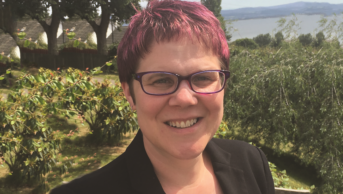
The Royal Pharmaceutical Society’s (RPS’s) three national pharmacy boards held their first meetings of 2023 via Zoom on 8 February 2023. A joint meeting of all three boards took place in the morning, followed by separate national pharmacy board meetings in the afternoon.
Opening the joint board meeting in the morning, Thorrun Govind, chair of the English Pharmacy Board (EPB), welcomed board members, guests and observers.
Apologies were received from Ewan Maule of the EPB and Helen Davies and Eleri Schiavone of the Welsh Pharmacy Board (WPB). Apologies were also received from Iain Bishop and Josh Miller from the Scottish Pharmacy Board (SPB) for the morning session only.
It was also noted that Ellie Thomas had stepped down from the WPB and Rafia Jamil was welcomed to her first meeting as a WPB member.
UK Commission on Pharmacy Professional Leadership
Noting the report of the UK Commission on Pharmacy Professional Leadership, published on 6 February 2023, Paul Bennett, chief executive of the RPS, said that the Society had published an initial statement the day of the report’s release.
“[The report] makes a number of significant observations and very significant recommendations and will need close scrutiny and assessment,” Bennett said.
“It is now the intention of the RPS to consider this [report] carefully before commenting on specific detail within it.”
Bennett added that the Society’s current priority is to “listen to members and pharmacy organisations and understand everyone’s views on the report’s findings”, reiterating that members can share their views by contacting the Society by email or telephone.
Bennett also told attendees that the RPS Assembly was planning to hold an additional meeting on 20 February 2023 “to consider what we hear from those who share their views, and to consider the report and recommendations”.
“We are in open and constant dialogue with other professional leadership bodies and specialist professional groups,” he added.
Quoting the RPS’s initial response to the commission’s report — “We recognise our role in pharmacy professional leadership needs to be different and more inclusive” — EPB member Mike Maguire told attendees that it was “important that when we say our role needs to be more inclusive … we need to take members and non-members on that journey”.
Fellow EPB member Tase Oputu asked about other plans to actively hear from members, to which Bennett responded that the Society would also put together a short survey for Society membership.
“I’d like the Assembly meeting to consider what more we can do to bring in views and opinions,” Bennett said.
“The report authors recognised that this process is a three to five-year time horizon; it is important we take time to hear and consider. We are in active listening mode at this time and it’s important we don’t rush in, but suggestions about how we listen are warmly welcomed.”
Business plan
Elen Jones, director for RPS Wales, told attendees that priorities fall into three “buckets” across the three nations: advancing professional practice; professional belonging; and professional engagement.
She noted that, in 2022, RPS Scotland launched ‘Pharmacy 2030: a professional vision‘ in February; RPS Wales outlined its 2025 goals in ‘Pharmacy: Delivering a Healthier Wales‘ in October; and England launched its ten-year ‘Vision for pharmacy professional practice’ in December, in collaboration with the King’s Fund.
Jones added that alignment across the three nations is important to “drive the profession along in the same direction”.
She pointed out that RPS Wales was three years into its plan, and the setting of 2025 goals had seen “extensive engagement through Wales”. She said the Welsh government had already established a delivery board and that it had transferred responsibility for that to the RPS, with funding.
Jones also stated that health inequalities would continue to be a focus, as would strengthening pharmacy governance, on which the Society published a position statement in autumn 2022.
In the areas of workforce wellbeing and inclusion and diversity, Jones said the pharmacy sector is “seeing the same struggles” and that the Society wants to be a strong voice advocating for the changes the sector needs to see.
Heidi Wright, English practice and policy lead at the RPS, said the Society was meeting with NHS England regarding expressions of interest in pharmacist independent prescriber ‘pathfinder’ sites and was keen to see a minor ailments scheme, building on things already present in the community pharmacy contract.
Following the launch of its vision, James Davies, director for RPS England, said the focus was now on the implementation plan and how to make the vision a reality. He said this would cover three key areas: first, to share the vision, including sending it to integrated care systems (ICSs); creating a vision oversight group “to hold it to account”; and “supporting ongoing work of a specific vision on community pharmacy“.
Laura Wilson, whose appointment as director for RPS Scotland commenced on 23 January 2023, said work has been ongoing to bring Scotland’s ‘Pharmacy 2030’ to life. In November 2022, RPS Scotland held a roundtable, jointly with the General Pharmaceutical Council, on access to data, which was attended by several MSPs.
She added that the Society’s position on health inequalities is a focus area for Scottish government.
English National Pharmacy Board meeting
Discussing England-specific priorities for the year ahead during the EPB’s afternoon session, James Davies said the Society was in the process of putting together a leadership group to give oversight of progress towards its vision document.
He said the Society is supporting ICS leaders ”to be aware of the vision and to embrace it”, while working with community pharmacy leads linked to the Pharmaceutical Services Negotiating Committee’s work.
Davies also noted that the Department of Health and Social Care’s national overprescribing review, published in 2021, recommended that the Royal College of GPs and RPS develop a repeat prescribing toolkit and training resources.
“[NHS England will] support us in delivering that,” he said, adding that a team was in place with a workstream for the next 18 months.
He also pointed out that NHS England’s long-term workforce plan is expected to be delivered in spring 2023.
“When it comes out, we need to continue to ensure that pharmacy is in the plan,” he told attendees, adding that the Society will “continue to advocate for [protected learning time] to be included in the planning process”.
EPB member Ciara Duffy highlighted the move towards targeted medicines in light of health inequalities and asked if the Society had considering liaising with the Specialist Pharmacy Service and integrated care boards around ‘radiomedicines’ and the role of pharmaceutical scientists in helping pharmacy teams roll out these services.
Davies agreed that health inequalities was a “huge” issue in terms of access to radiopharmaceuticals and technical services, the NHS aseptic programme and the consolidation of those services.
He went on to present a series of recommendations and planned actions arising from the vision for England, including direct referral into other services by pharmacy teams integrated into local care pathways; pharmacy access to patient records with contemporaneous recording of interventions on an electronic record accessible to all healthcare professionals; and advanced, specialist and consultant pharmacy roles in all settings.
In relation to pharmacy access to patient records, Sibby Buckle, member of the EPB, said: “We need to get the ability to populate records before we hit 2026, and most people being independent prescribers — so there is a sense of urgency”.
“We could push robustly for enhanced summary care records (SCRs) for patients — the standard SCR doesn’t have vaccination history but enhanced does,” Buckle added. “That is separate from independent prescribing and I see that as an urgent imperative.”
Scottish National Pharmacy Board meeting
Discussing its plans for the year during the afternoon session, Catriona Sinclair, vice chair of the SPB, noted that the Scottish government was funding pathfinding work for a new care service, “and some of that is around rural health inequality”.
SPB member Lola Dabiri said that she was one of the sustainability champions in NHS Grampian and asked about engaging manufacturers in addressing environmental sustainability.
“A lot of challenges with waste stem from the manufacturing part of the journey,” she said, adding that a lot of waste is generated in hospital, and GP and out-of-hours services, owing to not being able to re-issue unused medicines, such as those that have not been picked up by a patient.
“Once you write a patient’s name, you can’t re-use it. But in community pharmacy, it can be put back to stock and relabelled, as it has been in a controlled environment.”
Laura Wilson said that Parastou Donyai, chief scientist at the RPS, “has a keen interest in medicines reuse, so that’s on our work plan for sustainability”.
Ross Barrow, head of external relations at RPS Scotland, went on to present findings from an annual exercise to measure the Society’s engagement with MSPs. He said the latest results showed that 42% of MSPs who responded said they know a “fair amount or more” about the RPS, which was “really encouraging in the first year of parliament”.
Barrow added that 57% of respondents thought favourably about the RPS and that 51% recall satisfactory contact with the Society over the past year.
Welsh National Pharmacy Board meeting
In a workshop held during the afternoon, Alwun Fortune, policy and engagement lead at RPS Wales, asked board members what recommendations could go into a report on a clinical review of hospital services in Wales.
Elen Jones noted that the RPS early careers group had expressed some frustration that pharmacy roles are changing but senior staff have not always recognised that, and said “we will do some work around that”.
Cheryl Way, chair of the WPB, asked: “The discharge medicines review (DMR) unites community and hospital pharmacy — could DMRs be done in general practice by pharmacists?”
WPB member Dylan Jones said that he often had to refer patients to A&E on Saturdays when there was no other option and said there should be a way that pharmacists can write down why they did this.
On a related note, WPB member Geraldine McCaffrey said that an easy way of informing a community pharmacy that a patient was in hospital would be good. She raised the matter of sending prescriptions to community pharmacists and said that a conversation would be useful about “what is appropriate to send to community pharmacy to expect them to dispense”.
“There is a lack of understanding in the sectors about what you can get in community versus hospital,” she added.
Summing up, Jones said that she and Fortune would continue visiting Welsh hospitals and would share some of the early review recommendations with the board as they develop.
- The next national pharmacy board meetings will be held on 25 April 2023


